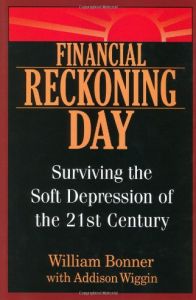Join getAbstract to access the summary!

Join getAbstract to access the summary!
William Bonner and Addison Wiggin
Financial Reckoning Day
Surviving the Soft Depression of the 21st Century
Wiley, 2003
What's inside?
The U.S. over consumes and has bad debt. It mirrors Japan’s slump. Boomers are aging; depression is coming. Now what?
Recommendation
This book is an intellectual tour de force. The breadth of the authors’ accomplishment is impressive, drawing on sources from Emerson to Einstein to Freud to Adam Smith and more. Whether their analysis is correct, however, is highly debatable. One could build a small mountain out of books that have declared prematurely that the American economic miracle is over. This volume draws heavily on the Japanese model to predict continued economic doldrums in the U.S., and the comparison seems a poor fit. Its over-reliance on a continental historical perspective - Americans are naïve, overly optimistic fools whose prosperity is the result of dumb luck - seems fairly dubious. None of that takes away from the authors’ keen perspective. Right or wrong, they bring intellectual light to the question, ’Just what is going on with the American economy?’ Because of this volume’s range and insight, getAbstract.com very strongly recommends it, especially to those seeking historical and cross-cultural context for alternative views about the U.S. economy.
Summary
About the Authors
As president and CEO of Agora Publisher, William Bonner leads one of the U.S.’s largest financial newsletter companies. Bonner founded the Daily Reckoning, a contrarian financial newsletter distributed via e-mail. Addison Wiggin is the Managing Editor of the Daily Reckoning and a former employee of the Cato Institute.





















Comment on this summary